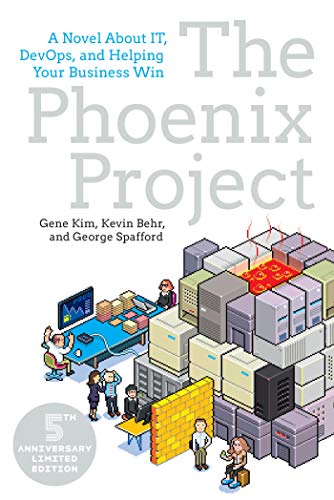Overview of The Phoenix Project: A Novel about IT, DevOps, and Helping Your Business Win Link to heading
Summary Link to heading
The Phoenix Project is a business novel by Gene Kim, Kevin Behr, and George Spafford. The story follows Bill Palmer, an IT manager at Parts Unlimited, who is tasked with leading the Phoenix Project, the company’s most critical and failing initiative, aimed at rescuing the business from financial disaster. The narrative explores the challenges faced by IT departments in the modern business environment, highlighting concepts from DevOps and lean manufacturing to transform IT operations and improve workflow efficiency. Throughout the novel, Bill learns valuable lessons on collaboration, productivity, and leadership, drawing parallels to assembly line production to improve output and deliver value to the enterprise.
Review Link to heading
The Phoenix Project is praised for its accessible and engaging storytelling, effectively illustrating complex IT and business operations challenges through its fictional narrative. It’s widely acclaimed for making DevOps principles tangible and relatable to readers through practical scenarios and characters. The novel not only provides a foundational understanding of DevOps but also humanizes the pressures and struggles within IT departments. While some readers may find the narrative approach to technical concepts somewhat simplified, the novel successfully bridges the gap between technical and non-technical audiences, making it a valuable resource for industry professionals and managers.
Key Takeaways Link to heading
- Three Ways of DevOps: The book introduces the “Three Ways” - principles that guide the transformation of IT work. These include improving flow, amplifying feedback loops, and fostering a culture of continual experimentation and learning.
- Value Stream Mapping: Highlighting the importance of identifying and optimizing the flow of value throughout the organization’s processes.
- Collaboration & Communication: Stresses the critical role of interdepartmental collaboration and communication in achieving successful project outcomes.
- Experimentation & Learning Culture: Encourages creating a safe environment for teams to experiment and learn from failures without fear of blame.
- Importance of Leadership: Underlines the crucial impact of leadership in steering organizational change and fostering an environment conducive to innovation and productivity.
Recommendation Link to heading
The Phoenix Project is highly recommended for IT professionals, managers, and executives who are interested in understanding and implementing DevOps principles. It is particularly useful for those looking to improve IT efficiency, enhance collaboration, and foster a culture of continuous improvement within their organizations. By addressing common industry challenges through a compelling narrative, this book appeals to both technical audiences and business leaders seeking to bridge the gap between IT and business objectives.
